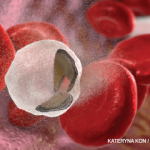ACR CONVERGENCE 2021—Hematologic abnormalities are common in systemic lupus erythematosus (SLE), whether due to SLE itself or something else. As rheumatology professionals, we are routinely challenged by the management of cytopenias in our SLE patients.
At the ACR’s annual meeting in 2021, two hematologists shared expert advice regarding common hematologic manifestations of SLE. Michael B. Streiff, MD, professor of medicine and pathology in the Division of Hematology at Johns Hopkins University School of Medicine, Baltimore, provided valuable insight into platelet and coagulation disorders in SLE. Nancy Berliner, MD, the H. Franklin Bunn professor of medicine and chief of the Division of Hematology, Brigham and Women’s Hospital, Boston, covered high-yield topics in anemia and neutropenia.
Thrombocytopenia
Dr. Streiff kicked off the session by explaining his approach to thrombocytopenia, a common feature of SLE. Platelet counts of less than 100,000/μL are seen in 10–25% of SLE patients. This is most commonly caused by lupus itself, immune thrombocytopenia (ITP) or antiphospholipid syndrome (APS).1

Dr. Streiff
Dr. Streiff outlined a stepwise approach to the treatment of a patient with SLE and low platelets:
Step 1: Identify the Cause
What is the time course of the platelet drop? “An acute drop might be caused by a new medication or illness, whereas a chronic progressive course has a different differential [diagnosis],” Dr. Streiff said.
Next, is this a production problem or a destruction problem? “Bumps with platelet transfusion mean this is probably a production issue, although bone marrow biopsy would be the gold standard to confirm that. An elevated immature platelet fraction (iPF) points to destruction,” Dr. Streiff said.
Step 2: Initiate Cause-Specific Therapy
“If the cause is SLE itself, treat the flare,” Dr. Streiff advised. “If ITP is suspected, immunosuppression is indicated. If the cause is an antiphospholipid antibody syndrome (APS) flare, optimize anticoagulation, confirm the patient is receiving hydroxychloroquine and treat catastrophic APS with additional therapies if needed.”
Immune Thrombocytopenia
When it comes to ITP, standard ITP therapies are effective when ITP is associated with lupus. Dr. Streiff noted the initial response rate to corticosteroids is excellent (up to 80%), but wanes over time and comes with a buffet of adverse effects. For severely low platelets, intravenous immunoglobulin (IVIG) is an effective addition to initial steroid therapy.2
“For steroid sparing [therapy], rituximab is my go-to [because] it works well and has a low side-effect profile. If rituximab isn’t successful, I look next to thrombopoietin (TPO) mimetics— eltrombopag or romiplostim. Both are also very effective, but I use them less in concomitant APS [because] rare thrombosis has been reported with both drugs. Third-line options include mycophenolate mofetil or azathioprine, but patience is necessary with these since they take two to three months to kick in. In refractory cases, splenectomy is another option,” he said.

